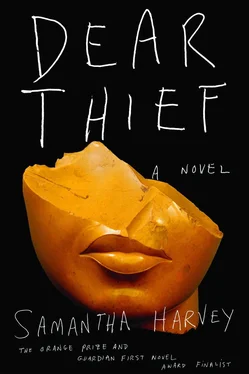The man said, somewhat desperately, ‘You are love of my life.’ This might have been the first thing said between them while standing outside or it might just have been the first thing I noticed them say. His voice was deep, not English, maybe Hispanic, I don’t know. And the woman replied, in an exaggeratedly deep, soft voice that might have been done to mimic his, ‘You are the love of my life. You must use the in front of love , it’s the rules.’
Maybe the poor man was embarrassed; I could imagine him stooping his shoulders and almost curtseying away from the mistake. ‘However you say it. I am sorry.’
‘Don’t be sorry, I just wanted you to know, for when you need to use it in the future.’
He must have missed the playful insinuation there because he just said, ‘I don’t understand. All this the and a , you think it will be simple, it is never simple.’
‘Yes, it’s simple, amigo, it’s just a little word. Don’t be a child, come on.’
And she laughed, and maybe she ruffled his hair or tugged lightly at his collar.
I think I had stopped breathing at this point; I had certainly stopped moving. It was not only that her voice was just like yours, but that I remembered you having almost exactly the same conversation once with a man in Embankment Gardens. Do you remember? A stranger came up and declared his love for you, and you kindly corrected his grammar. You saw his embarrassment and you took his hand so that you could draw him down to the grass, with the care of someone handling an animal that is dependent on them — and you gave him an impromptu lesson on the definite article and abstract nouns.
I don’t know if this memory can possibly be true; it seems too much of a coincidence. I thought perhaps it was just that the woman’s voice reminded me so much of you that I had suffered déjà vu. And yet the memory feels to exist independently of that moment last night, so much so that I can remember what you said to the stranger on the grass: ‘ The narrows down big things, there is ocean and there is the Pacific Ocean, air and the air in one’s lungs, love and the love of one’s life. Beware of the , it has a tacit manifesto to bound and restrain.’
Your words: tacit manifesto to bound and restrain . You said this and then you both stood from the crouch and he went on his way. Whereas the couple outside said nothing of this sort. I thought — but I could be wrong — that the woman said something about being too old to start being the love of someone’s life; at her age it was too long a race to start running. She had come here to see old friends, that was all. Am I right about this? That she said she had come to see friends, whom she believed lived here. And the man muttered or swore in a foreign language, or at least in an accent I couldn’t recognise. But this was murmured and a floor below, and though I was by then right by the open window I hadn’t wanted to stand in front of it or lean through; perhaps I am mad or deluded and overheard wrongly — and yet. After this they either didn’t speak at all or what they said was now more whispered than murmured. It made me wonder if they were holding one another, or whether he had hunched his shoulders in pain or anger and was jabbing his foot at the pavement, or was staring past her at the wall.
I only looked out of the window when I heard the click of the woman’s heels along the street, left towards Jimmie’s. I put my head out and I saw the man on the other side of the road, standing with his hands in his pockets as if trying to decide which way to go. He looked up at me, then he walked away to the right. Mine is a long street, which you will know if the woman was you, and so when I turned I could see you partway along it, going, like I said, towards the main road with your head down and hands in the pockets of your raincoat. It was one of those elegant raincoats that are belted at the waist. You would be in your early fifties now, but you looked no older than when I last saw you, in any case from behind and at a distance and in the dark. It was your walk and yours alone, the long, loose stride that is nonetheless not flowing but forging. People tend to either flow or forge when they walk, and if they forge they are never loose. They map out their destination, set their stride, and brace and aim. But you — never content, I suppose, to practise convention — you forge loosely. Which is not to say you have a great inbuilt sense of purpose, more that you proceed like a sailing boat pushed forward by a tailwind. The boat is a meanderer, it is the force at its back that makes it look purposeful. The thing chasing it.
I ran downstairs in jeans and T-shirt and whatever shoes were to hand. No, let me pause one more time to tell you what happened before I ran. I took my keys from the chest of drawers in the bedroom and I looked at the pillow and projected a day forward, when Nicolas’ face might be half buried there, swampy with jetlag — and a thought occurred to me that seemed to be the first truly religious thought I have ever had. It went: If she is here and he wants her still. It was not, as you see, much of a thought, not even complete. This is how I recognised it as religious — one of those enormous broken offerings we make, someone stammering in front of the Lord. It was a thought that was braver than the person who had it, which is why cowardice stopped the sentence halfway through. If she is here and he wants her still. The rest of the thought had to be had unconsciously, and directed at me as if it had come from a better mind than my own. If she is here and he wants her still — it told me — then you will stand aside and be good enough to let them both go.
Then I picked up the keys and thought, as I went back through the living room, past the escritoire where this letter is kept, that this must be grace, to be defeated by one’s better nature. I thought there must be nothing beyond this left to say on the subject, that defeat had come in one passing moment of imagining Nicolas’ head so conspiratorial on my pillow — and how sweet it was, and uneventful, and how it shocked me.
I ran downstairs in jeans and T-shirt and whatever shoes. By the time I was out on the pavement there was no sign of you; I ran all the way along until my street met Guilford Street, but by that point you could have gone in any direction — left towards Russell Square, north towards Euston, right towards Gray’s Inn Road, which led on to a hundred streets I didn’t know at all, and so I stood in the rain for what I suppose was much less than a minute, but felt like ten, peering almost aggressively into the darkness before I gave up. I called out: Nina? Your name rushed to my lips like that, and left them warm. And just for a moment the years slipped back to times when it was only us, and you were in that chair in the dark. I thought I would go back and find that man you had left in the rain. I went back, and not only was he not there, but the whole street was empty. I think I have never seen it empty before; it was as if I had imagined not just you, but humankind as a whole, as if I were the last person on Earth.
 Photo: Matthew Lincoln
Photo: Matthew Lincoln
Samantha Harvey has published two novels, The Wilderness and All Is Song . She has been shortlisted for the Orange Prize for Fiction, longlisted for the Man Booker Prize, shortlisted for the Guardian First Book Award, and won the AMI Literature Award and the Betty Trask Prize. She was recently named by The Culture Show as one of the 12 Best New British Novelists.
Читать дальше

 Photo: Matthew Lincoln
Photo: Matthew Lincoln










